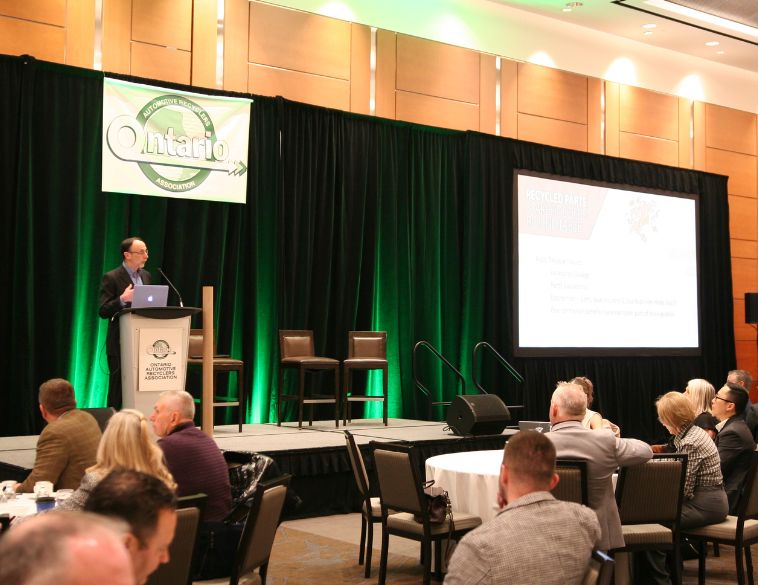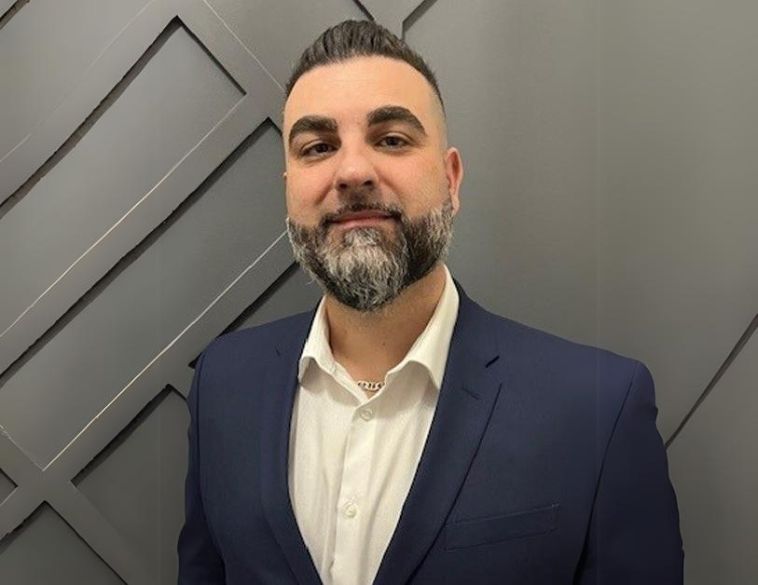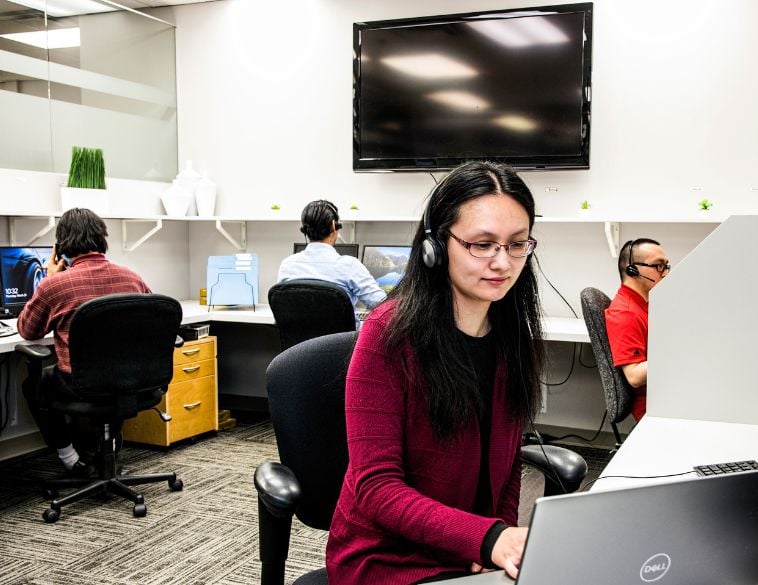Despite current economic conditions, there is optimism in the auto recycling space.
From March 21-23, the Ontario Automotive Recyclers Association (OARA) held its 2024 Convention and Trade Show. For 2024, the three-day event took place at the Hilton Markham Suites in Markham, Ontario, just north of Toronto.
The convention is always a highly anticipated event and this year’s was no exception. Attendees came from far and wide, not only from across the province of Ontario, but from different parts of Canada as well as the U.S.
Friday sessions
Following an OARA board meeting and first annual Recycle Auto Part-Y social gathering, on March 21st, the information sessions kicked off the following morning.
OARA Executive Director Steve Fletcher welcomed attendees and provided an overview of some of the developments happening at the association level.
He was followed by Greg Woodbeck, of Woodbeck Auto Parts and OARA Board Member, who provided an outline of the events and activities taking place during the convention and trade show, as well as taking the opportunity to thank both sponsors and exhibitors, as well as mentioning some individuals, including Steve Fletcher, for his leadership and guidance, as well as the tireless volunteers who help ensure the event runs smoothly, including Christy Earl, of Hotch’s Auto Parts; Carolyn Carcone, from Carcone’s Auto Recycling and Gloria Mann of Media Matters who ran the registration desk and coordinated activities over the course of the event.
Next on the podium was Mario Venditti, from Triple M Metal, who introduced the first key speaker of the day, Sean Davidson, CEO of Davis Index, a research firm that provides market intelligence for the global recycling and alloys industry, as well as the founder Jules AI, which helps recycled materials organizations manage and automate their trade flow.
Scrap metal trends
Davidson delivered a fascinating presentation that looked at the trends and factors currently influencing scrap metal markets around the world, and how the metals industry will likely impact global trade and manufacturing in the years and decades to come.
Davidson noted that today, more and more governments and organizations are beginning to understand the value of scrap metal, particularly as it relates to Environmental and Social Governance (ESG) and Net Zero targets. “They are discovering what we’ve known for decades,” said Davidson, namely that it requires less energy to produce products from scrap than using raw materials. “It won’t be possible to achieve these net zero goals without scrap,” declared Davidson, noting that laws are likely to become more favourable to those who are already engaged in working with scrap metal, either helping create it from end-of-life products (such as auto recyclers and shredders do with cars and trucks), as well as those that manufacture and distribute products that are created from scrap. “Using scrap keeps these products out of landfills and requires less energy to produce new material.”
With the current push towards electrification, including EVs and heat pumps for homes and other buildings, an unprecedented amount of materials (approximately 6.5 billion tonnes), will be needed between now and 2050.
Davidson said that growth in EV manufacturing will result in scrap demand exceeding supply, resulting in a greater than ever need for steel. And in conjunction with that, will be more protectionist legislation from around the world, as various countries begin to understand just how valuable of an asset locally produced steel is.
“We are moving away from free market capitalism and need to be more pro-active on the policy side,” declared Davidson, who explained that greater protectionism could negatively impact recyclers, resulting in lower prices and profits that are no longer based on true supply and demand, but rather government regulation.
He stressed the importance of paying attention to global scrap markets, such as Turkey, which represents the single largest market for seaborne scrap, as well as other major players such as India, Pakistan and Bangladesh, since demand and accessibility of scrap in one part of the world will have an impact on pricing in another—Davidson citing an example of scrap demand and availability in the Black Sea impacting prices in Iowa.
Vehicle and parts considerations
Shifting from the materials side to finished parts, namely components required for performing collision repairs, Ryan Mandell, Director, Claims Performance, Auto Physical Damage at Mitchell International, looked at current vehicle trends that are likely to impact auto recyclers today and going into the future.
Key factors include growing vehicle complexity, supply chain concerns; the growth in demand for electric vehicles, as well as significant inflation related to replacement parts.
Mandell explained that for a long time, the average growth rate in collision repair costs was around 3.5% per year. Since the COVID-19 pandemic however, those increases have spiked significantly. “In 2022 we saw the rate increase by 10.5% and it has already been trending higher than 9.01% for 2023,” Mandell stated.
He explained that with inflation, on-going disruptions in global supply chains and increasing vehicle complexity, the collision industry is “experiencing this perfect storm of variables that is increasing the cost to repair vehicles.”
And with the cost of new aftermarket and even OEM replacement parts significantly impacting estimates, as well as the growing number of parts required to fix late-model vehicles due to added complexity and technology—current economic conditions represent a very significant opportunity for auto recyclers.
New threats
Mandell explained that while the major supply chain disruptions experienced during the COVID era have subsided, new threats have emerged, including ongoing tensions in the Red Sea, where Houthi rebels from Yemen, backed by Iran are attacking cargo ships. “Approximately 12% of global cargo transits through the Red Sea,” said Mandell, noting that some experts, including the CEO of Danish shipping giant Maersk, expect this issue to last through the summer. With the Red Sea a current trouble hot spot, many freight carriers are choosing to have ships pass via the horn of Africa which adds several weeks to transit time, adding delays and costs which will impact aftermarket part availability and pricing.
On the vehicle electrification front, Mandell noted that data points to a faster EV uptake in Canada versus the U.S., and with more of these vehicles on the roads, more are going to be involved in collisions and will need repairing. Yet there are some fundamentals for repair shops to consider. Firstly, that while EVs have fewer moving parts than internal combustion engine (ICE) vehicles, they tend to have more crash parts. Furthermore, with no engine up front or behind, the way they absorb damage is very different. A case in point is the Ford F-150 Lightning. Comparing it to the gasoline fueled F-150 XLT EcoBoost V6, Mandell said that when Mitchell rote estimates on examples of both vehicles, the Lightning featured parts the XLT didn’t have, namely a $200 bumper isolator and a $1500 grille reinforcement. Furthermore, with no engine to absorb energy from a crash, more damage is likely to result on the Lightning from the same type of collision, adding to repair time and cost, which Mitchell said was 30% greater for the Lightning, compared with the XLT.
Favourable conditions
With greater complexity and the rising costs of new parts, Mandell said that market conditions are proving very favourable for auto recyclers, who aren’t impacted by global supply chains, and can get good quality, OEM original parts to collision centres significantly faster and for less money than a shop trying to order new replacement components. And with EVs requiring more crash parts following collisions, along with late-model ICE and hybrids (facilitated by more ADAS systems including cameras and sensors), there’s arguably never been a better time to be in the automotive recycling business.
Following Mandell’s session there were four “Speed Presentations,” where vendors were given an opportunity to showcase their products and solutions, along with the benefits they provide for recyclers. Lithion Technologies, Cyclic Materials; SalvageScan and Environmental 360 Solutions all provided some very interesting information on ways to harvest and re-purpose valuable raw materials, including battery recycling and repurposing almost any type of battery (Lithion); harvesting and recycling permanent magnets from electric motors (Cyclic), using AI technology to determine the best price and demand for EV and hybrid batteries (SalvageScan) and efficient waste and recovering solutions (Environmental 360).
A popular session at the 2024 OARA Convention, was an interactive discussion that focused on Succession Planning. Moderated by Greg Woodbeck, the panel featured Dave McDonald from Bodyline Auto Recyclers in Hamilton. Ontario, Mary Poirier from Valley Automotive in Pembroke, Ont., and Dominic Vetere from Dom’s Auto Parts in Courtice, Ont.
Sooner rather than later
All three operate family businesses and shared very personal experiences about succession planning and how important it is to come up with an imperfect plan rather than no plan at all. While each situation for each business and each family will be different, and disputes can sometimes be hard to avoid, the consensus among the panelists was that it is better to create a succession plan sooner rather than later. Additionally, they stated that in order to ensure a successful transition, whether that be to the next generation of family members or selling the business to an outside operator, it’s important that any plans are thoroughly detailed and put in writing, plus clear, concise communication is essential through the entire process for everybody involved, including family members, potential buyers, as well as respective legal and accounting teams.
Furthermore, if the business is being handed over to the next generation of family members, the panelists all agreed that it was imperative that they have an active interest in taking over, and secondly, the younger generation earn their stripes and prove they are both keen and capable of running the business before the actual sale takes place.
The final and keynote session on Friday, came courtesy of JC Cahill, CEO and founder of VINMatchPRO. With a highly successful track record in the industry, having run auto salvage and recycling facilities in Washington State and Massachusetts, Cahill founded VINMatchPRO, recognizing there was a need for recyclers to have user friendly access to purchase, sell and inventory vehicles and parts, especially given the proliferation in technology-based components such as cameras and sensors found on late-model cars and trucks.
Tackling misinformation
Cahill noted that misinformation is major challenge for many auto recyclers today, since there are more parts on vehicles, and with more opportunities to harvest and sell components off salvage cars, there’s greater risk of a customer not getting the part they need to repair a vehicle following a collision, since the right information, particularly related to ADAS components isn’t often accurate, or widely available.
Another issue is that OEMs are updating their vehicles and facelifting or redesigning them so quickly today, it can be hard for aftermarket parts suppliers to keep up. While this does result in more difficulty when it comes to reproduction parts, it also results in more opportunity for recyclers who have these vehicles in their yards and a wealth of parts that can be sold to collision repairers, including headlight and taillight assemblies, as well as truck tailgates, which are increasingly being trademarked by OEMs.
While there are significant opportunities for recyclers in that they have these OEM parts readily available and aren’t significantly impacted by global supply chains [helping collision centres mitigate parts delays, while at the same time helping them and insurers improve their ESG and Net Zero scores—since the parts have already been manufactured], there are challenges facing recyclers.
Cahill said that today, inflation and rising operating costs, coupled with higher labour rates and the decreasing cash value of vehicles are making it tougher for many operators. Cahill explained that in some cases, the value of the land on which a recycler operates can often be worth significantly more than the amount of money the business generates, making it very tempting to sell the business to consolidators or wind-up operations and sell off the land to developers.
Strong demand
Nevertheless, he noted that demand for used vehicle parts is strong and will likely only get stronger in the future, meaning that savvy operators have a real opportunity to create a profitable and sustainable long-term business.
He noted that doing so, will require being efficient when it comes to buying vehicles and selling parts, making sure you hire the right people for the job, and know the revenue that each employee generates. “Focus on the things in the business you can control,” he said “and build a can-do culture. Start with leadership; be open minded to make your employees feel valued and appreciated and always be willing to cross-train your team. Cross-train, cross-train and cross-train.”
Following Cahill’s keynote address was an on-site trade show with vendors from across the auto recycling spectrum, plus later in the evening, attendees had the opportunity to take part in on-site fundraisers, auctions and a casino, with funds raised for the OARA Employee Scholarship Program.
On Saturday, March 23, attendees were treated to a sponsored breakfast and a whole host of sessions. These included an EV profitability session, staff engagement best practices as well as several panel discussions, including one on Sales entitled Be Your Customer’s First Choice, plus a role-playing Sales vs Production Panel that proved both informative and entertaining.
A major highlight was an Employee “No Holds Barred,” session with business coach and management speaker Donald Cooper, that also featured participation poker.
Cooper, who was back by popular demand, also hosted Saturday’s keynote session that looked at ways to Accelerate Your Business! providing insight into how recyclers can take their operations to the next level while tackling a multitude of challenges including growing complexity, more regulations, compressing margins and talent shortages. Cooper acknowledged that while many of these issues are likely to endure, recyclers and business owners can position themselves to deliver consistent, superior customer service and value, as well as effective management practices and ultimately, long-term profitability.



